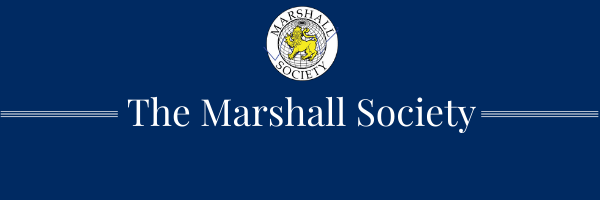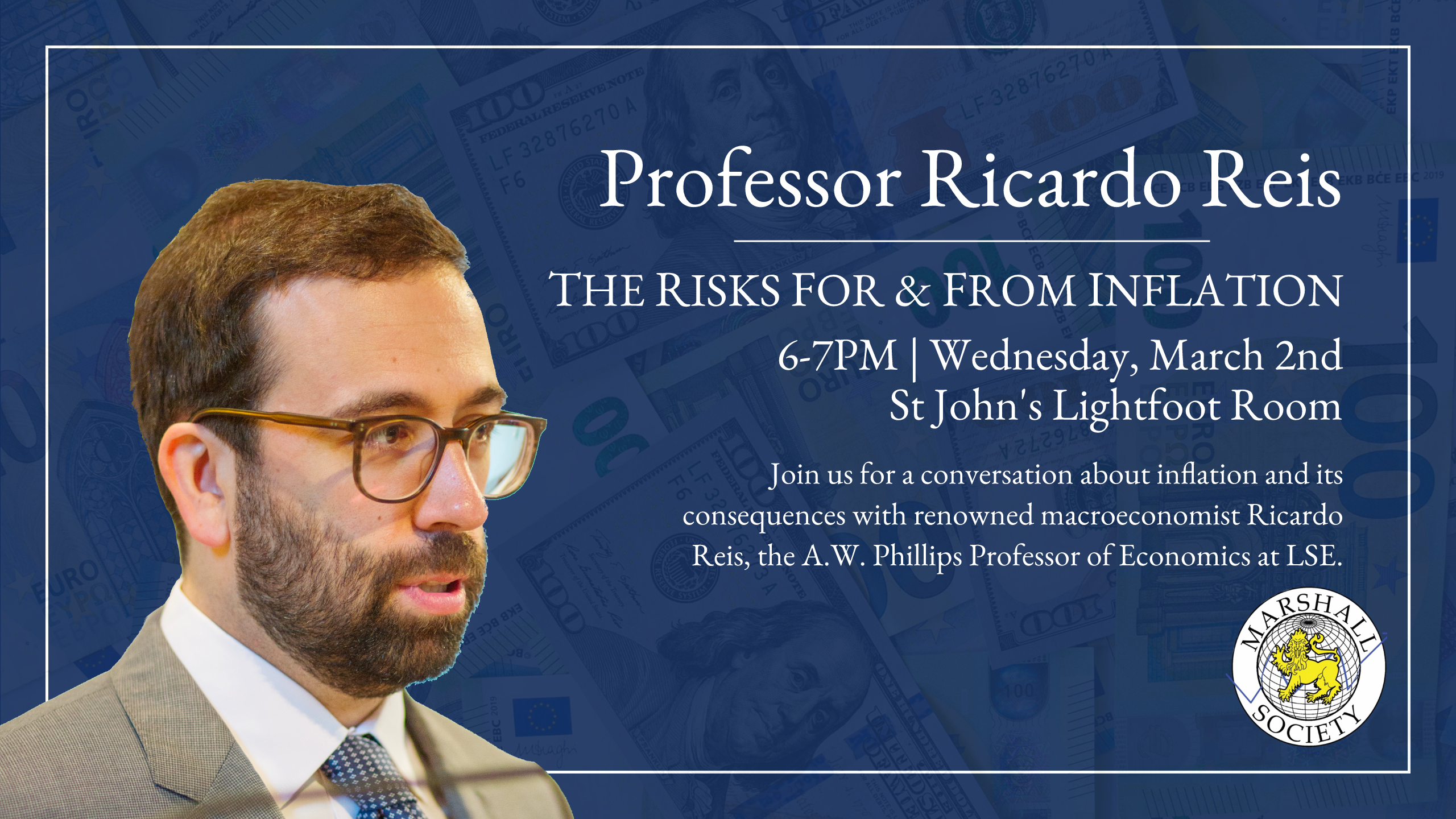Economic Surplus: Lent 2021/22 Week 6

Economic Surplus by The Marshall Society
1 March 2022
Welcome to the Economic Surplus, the newsletter brought to you by the Marshall Society! We are the University of Cambridge's flagship economics society. Every week, we bring you our bespoke commentary on economic trends, updates on our exclusive members' events as well as a summary of the headlines you can't ignore! You've probably received this email because you were previously subscribed to the Marshall Society's old email list, but if you have been forwarded this by a friend, feel free to subscribe here!
2:30PM, 2nd March 2022: The Marshall Society Presidential Election 2022
Location: St. John's Old Divinity School
It’s that time of year again! Election time.
Two candidates are running to be President of the Marshall Society this year: Harry Doughty (2nd year Economics Tripos) and Mátyás Váradi (1st year PhD Neuroeconomics). Good luck to them both.
To vote, you must be a Marshall society member. We will be voting in person at the event and announcing the future President shortly afterwards. If you want your voice heard, please do come. If you are unsure whether you are a member or not, do come anyway because we will bring our membership database.
We will be hosting the election event in St John's Old Divinity School on Wednesday at 2:30pm. The Marshall Society will have someone at the event entrance to guide you in.
6PM, 2nd March 2022: The risks for and from inflation - talk with Professor Ricardo Reis
Location: Footlight Room, Old Divinity School, St John's College
After decades of lurking in the shadows, inflation is back. What was a painful but distant memory is now a new reality. What causes inflation and what will be its consequences? To learn more about inflation join us for the event with renowned macroeconomist Ricardo Reis, the A.W. Phillips Professor of Economics at LSE. Professor Reis has extensive experience in public policy, working as an academic consultant at the Bank of England, the Riksbank, and the Federal Reserve system, as well as the Director of the Centre for Macroeconomics in the UK. Professor Reis is a prominent academic with his recent honours including the 2021 Yrjo Jahnsson medal and the 2017 BdF/TSE junior prize. His main areas of research are inflation, inflation expectations, and unconventional monetary policies. His public service includes writing a weekly column for the Portuguese press and developing European Safe Bonds (ESBies).
The event will include a personal address followed by an audience Q&A session.

7PM, 9th March 2022: Globalisation after Covid: Business as Usual, or Not? - a talk by Professor Beata Javorcik
Location: Kennedy Room, Cambridge Union
We are proud to host Chief Economist at the European Bank for Reconstruction and Development (EBRD), Professor Beata Smarzynska-Javorcik, for the event entitled ‘Globalisation after Covid: Business as Usual, or Not?’. Beata Javorcik is a Professor in Economics at the University of Oxford and a former senior economist at the Development Economics Research Group of the World Bank. Her research explores how developing countries and transition economies are able to harness globalization to stimulate the country's economic growth. Her involvement in other affiliations include Royal Economic Society London, CESifo Munich, International Growth Centre London, and Centre for Research on Globalization and Economic Policy at the University of Nottingham.
The event will include a 45-minute personal address followed by a 15-minute Q&A session.
Marshall's Thoughts - Political economy of the war in Ukraine
This week’s Marshall’s Thoughts are written by Jonathan Loke.
On 24th February at 3:00 GMT, ending months of stalled negotiations with the US and EU, Russian forces advanced on the Ukrainian cities of Kyiv, Kharkiv and Kherson. The 200 deaths so far reported by President Volodymyr Zelenskyy’sgovernment, 3 children among them, are the latest casualties in a war that has taken 13,000 lives since Russia’s annexation of Crimea in March 2014.
War is always grim and tragic, independent of the abstract political theories or cost-benefit analyses behind it. It is easy to treat violence that appears far-removed from many of our lives with an inhuman levity. One hopes that by applying the lens of political economy to this most recent war, this brief can respectfully clarify (i) its economic causes, to help make sense of the conflict; and (ii) its economic consequences, which affect us all.
President Vladimir Putin’s treatise On the Historical Unity of Russians and Ukrainians last July articulated an irredentist pretext for invasion,situating Ukraine as part of historical Russia. Less well-known is that Ukraine’s economy, referred to by the tsars as their Empire’s breadbasket, ishighly resource-rich. Investment Monitor’s Sebastian Shehadi lists several:
Raw materials
▪ 1st in Europe in proven recoverable reserves of uranium ores
▪ 2nd in Europe and tenth place in the world in terms of titanium ore reserves
▪ 2nd in Europe in mercury ore reserves
▪ 3rd in Europe in shale gas reserves
Energy
▪ 2nd largest explored reserves of manganese ores
▪ 2nd largest iron ore reserves, 3rd largest iron exporter
▪ 8th largest coal reserves
▪ 2nd in Europe in installed capacity of nuclear power plants
▪ 3rd in Europe in gas production, 4th largest natural gas pipeline system
Food
▪ 1st in Europe in arable land area
▪ 1st in exports of sunflowers and sunflower oil
▪ 3rd largest area of black soil (25% of world’s volume)
▪ 4th in rye production
▪ 5th in wheat exports
Placing Ukraine within Russia’s orbit would secure the latter’s access to vital commodities, and strengthen its bargaining position with European economies dependent on Ukrainian exports. In turn, Ukraine as a member of NATO or the EUwould be as much an economic threat to Russian importers as it would be a military one. And unlike Iraq’s invasion of oil-rich Kuwait in 1990, the US, now a net energy exporter, faces no direct economic threat from an incursion into Ukrainethat warrants retaliation. As Harvard University’s Stephen Walt observes, President Putin weighedthe economic opportunities of invasion against the slim probability of a military reaction from the West, and acted.
Russia’s invasion also carries wide-rangingeconomic consequences.
The first is a spike in commodities prices, particularly energy. While Germany’s suspension of Nord Stream 2, a pipeline that has not yet been placed online, was largely symbolic, Russia remains Europe’s main gas supplier. Anticipation of disruptions due to military operations or sanctions caused a jump in oil prices. OnFebruary 24th, Brent oil surged to 100 USD a barrel for the first time since 2014 and European gas prices jumped by 30%. A European Central Bank simulation exercise estimated a 10 per cent shortage in gas could knock 0.7 per cent off eurozone GDP, with the effects most pronounced among countries with large gas and electricity sectors and industries most dependent on gas. These effects are not uniform across the eurozone either: Portugal, Austria and Slovakia all would expect a fall in gross value added of 1.0%, while Netherlands and Luxembourg would expect a less severe 0.4% drop. Conflicting economic interests suggest a coordinated EU response to Russian escalation would be challenging. And it is impossible to estimate the extent to which tit-for-tat sanctions will affect the global economy.
Russia is also a large exporter of nickel, used in lithium-ion batteries, and palladium, found in catalytic converters, both vital in automobile manufacturing. This will further exacerbateincreases in car prices due to global chip shortages: in jurisdictions like the UK, 1 in 5 nearly-new cars already sell at more than their brand-new equivalents.
Ukraine’s large volume of commodities exports are also likely to be temporarily disrupted by war. For instance, disruptions to trade in wheat and corn may also lead to a scramble for alternative suppliers in the Middle East and Africa, which receive 40% of Ukrainian grain exports.
A second related phenomenon is even higher inflation persistence amid a more uncertain investment environment. The Centre for Economics and Business Research notes that inflation in major Western economies could hit close to 10%. This exacerbates already high inflation due to persistent supply-chain disruptions, demand recovery as governments revert to the pre-pandemic normal, and a slow response by the Federal Reserve to higher prices. Cambridge’s own Mohamed A. El-Erian argues that a decade of easy money has made financial markets particularly vulnerable to current market volatility. He provides 3 reasons: higher risk appetite due to years of predictable injections of liquidity; exposure of a more diverse crowd ofasset-holders, particularly members of the working and middle-class; and a shift of safer assets to central bank balance sheets under quantitative easing, which limits investors’ ability to insure against their higher-risk investments.Central banks now face the difficult decision of raising interest rates to manage higher inflation without damaging already shaky business confidence.
A third is a further fragmentation of commerce into Sino-Russian and Euro-American spheres. Since its invasion of Crimea, Russia has reduced its share of invoices denominated in USD, building up alternative foreign-exchange reserves. In particular, Russia has worked to insulate its trade and capital flows with China. Only 33% of payments from China to Russia now take place in dollars, and down from 97% in 2014. Even the impact of a ban for major Russian banks likeSberbank and VTB from Swift, a secure messaging service used for processing cross-border payments, may be limited. Russian firms could route payments through countries like China, using alternatives like Cips. And this movecould accelerate a shift away from USD as a reserve currency to the yuan or cryptocurrencies,which would undermine the purchasing power of the US consumer and increase the real value of USD-denominated debt.
Behind the clear human suffering and naked political objectives of war, economic considerations do animate the Russian invasion of Ukraine, and the world’s response to it.
In Case You Missed It:
Decade-High Food Prices Drive Poverty and Unrest in Africa | Wall Street Journal
This article outlines how global inflationary pressures are raising food prices in many African economies. This is paring back the recent improvements in poverty alleviation across the African subcontinent. Covid-19 testing requirements, high import-dependence, and drought have worked to limit food supply.
Afghan Economy Further Imperiled by U.S. Move to Split Assets | Wall Street Journal
This article discusses how American restrictions on the Taliban’s access to overseas central bank assets is contributing to a liquidity crunch in the Afghan financial system, driving down the Afghani and fuelling a humanitarian crisis.
China's business and economic interests in Ukraine | Reuters
China overtook Russia in 2019 to become Ukraine’s single largest trading partner. Ukraine is part of President Xi Jinping’s Belt and Road strategy of fostering regional trade connections and economic development. This article gives insights to the tight economic relations between the two countries, and China’s own ambivalence towards the destabilising military situation in Ukraine today.
That's it from us for now!
The Marshall Society